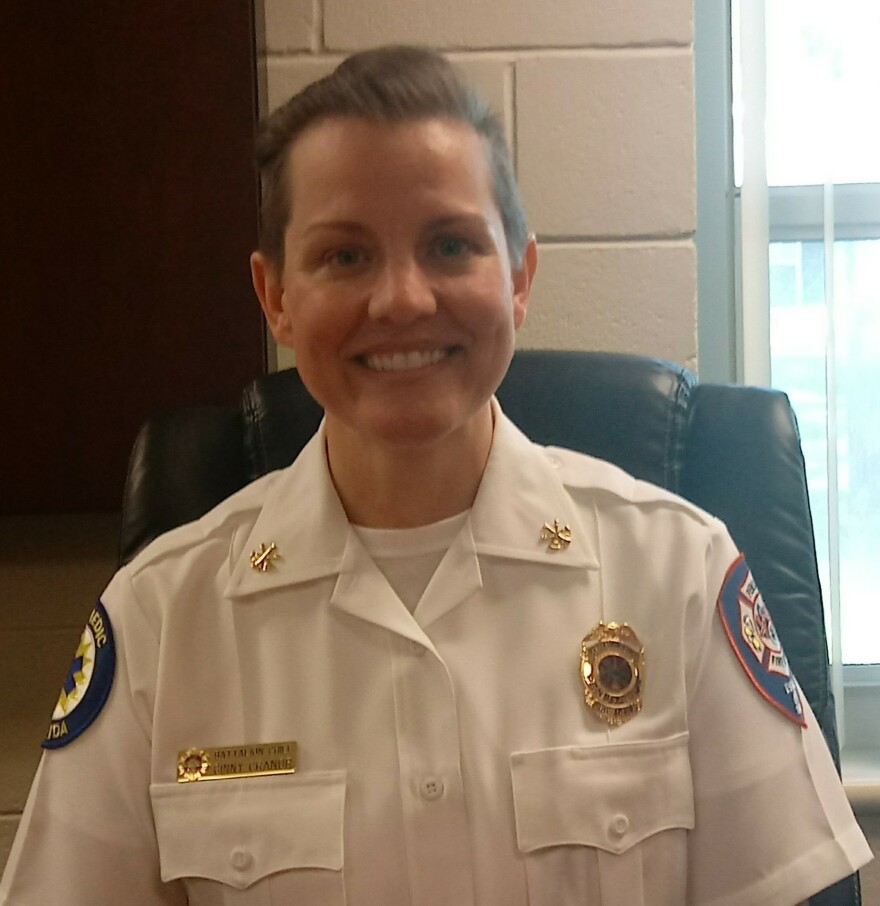First responders nationwide and locally are addressing the issue of mental health, both in-house and out in the field.
First responders — police, firefighters, emergency medical technicians — are at high risk. Day in and day out, they deal with dangerous and sometimes life-threatening situations, which can ratchet up mental health and cause post-traumatic stress disorder, depression, and anxiety—to name a few.
Because of the inherent risks, a number of agencies are establishing programs to help both the responders and the communities they serve.
“It’s important for people to know that getting help and identifying a mental health and wellness and seeking out the proper therapy is not this bad, dark cloud thing,” said Col. Mindy Young, who joined the Escambia County Sheriff’s Office after earning her master’s degree in mental health counseling at the behest of Sheriff Chip Simmons.
“He felt that it was very important that we started addressing the mental health needs and wellness of our employees, sworn and civilian,” said Young. "We have, as a culture, very quiet and stuck our heads in the sand when it came to the mental health needs of our law enforcement officers. And we’ve always expected them to go and deal with the deepest, darkest corners of our community, but then expected them to not let it bother them.”
Getting help with mental health issues is actually codified. The Law Enforcement Mental Health and Wellness Act became law in 2018. It says law enforcement agencies need and deserve support in their ongoing efforts to protect the mental health and well-being of their employees.
“If we take care of our employees and we help keep them with a healthy mind, they are a better servant and guardian to the community which we serve,” Young said.
One of the points to be made with establishing mental health counseling and other treatment for law enforcement officers is that – none of them is Robocop — to where they experience the deepest, darkest corners of the community, and then merely shrug it off.
“We’re all born human beings with emotional processes in our brains; it doesn’t change just because of the job we do,” Young said. “However, there’s just an expectation of what you should and shouldn’t do emotionally. Now we know that it’s OK to not be OK.”
On the other side of the fence are the people that law enforcement is sworn to serve and protect. ECSO is also developing a “co-responder” program where a deputy is paired with a mental health clinician, and perhaps a paramedic, to respond to mental health-involved calls.
“The individual in the community that is in an acute moment right then is able to get the services and resources that they need,” Young said. “Because we know now putting them in jail or passively committing them into a facility is not always the best option and doesn’t resolve the problem.”
“We’re definitely working with [ECSO] on this," said Pensacola Fire Chief Ginny Cranor. "The way that this would operate now when responding to somebody having a mental health crisis."
“First we start with the awareness and education of our firefighters, and de-escalation tactics; and then this connection piece where we’re connecting them to services,” she added. “We work with Escambia County EMS, who is the transport provider, and work with them on connecting these persons to services.”
The keyword, she says, is “resiliency” — our capacity to recover quickly. How firefighters are prepared to respond to stress with positive and flexible thinking.

“And there is this cumulative impact on mental health and well-being because our first responders respond to incidents involving traumatic events,” said Cranor. “There’s the dangers of firefighting and law enforcement; and incidents involving children or violence. Those are all uniquely and mentally taxing situations that first responders are exposed to.”
One big help for first responders is Florida’s Post-Traumatic Stress Law which also mandates training for first responders. Cranor says since then, major doors have opened, such as PFD’s peer support program.
“All first responders respond to these very dark moments; and then some joyful moments, too, in the course of our jobs,” said the chief. “But all of these different types of stress compounds with personal concerns of your children and then families, and finances. And just general life.”
Cranor, who’s approaching three decades in the fire service, admits to having to work through the macho mindset that was prevalent among first responders when she started. The bottom line, she says, is that mental health challenges can be physical illnesses and not choices.
“In our new firefighter checkoffs, we have a big book, so we can prepare these new firefighters to extinguish fires and perform medical tasks, but it also prepares them for this post-traumatic stress that they’ll experience during their life,” Cranor said. “That our new people coming in are prepared to be more resilient.”
Along with her agency’s personnel, Cranor says the task force is also preparing the community to recognize mental health issues on the same level as physical conditions.
“To respond to neighbors and loved ones and strangers, who are in crisis, who are struggling,” she said. “And trying to connect them to services that help them.”
At the end of the task force’s project, Cranor hopes that information can be translated to all first responders, to develop pre-education that includes support, debriefings, and a connection to licensed crisis providers, if necessary.
More information on mental health and wellness is available on a number of websites. Locally, at mentalhealthtaskforce.org, and at cdc.gov.
This is the second installment in our series on mental health.


